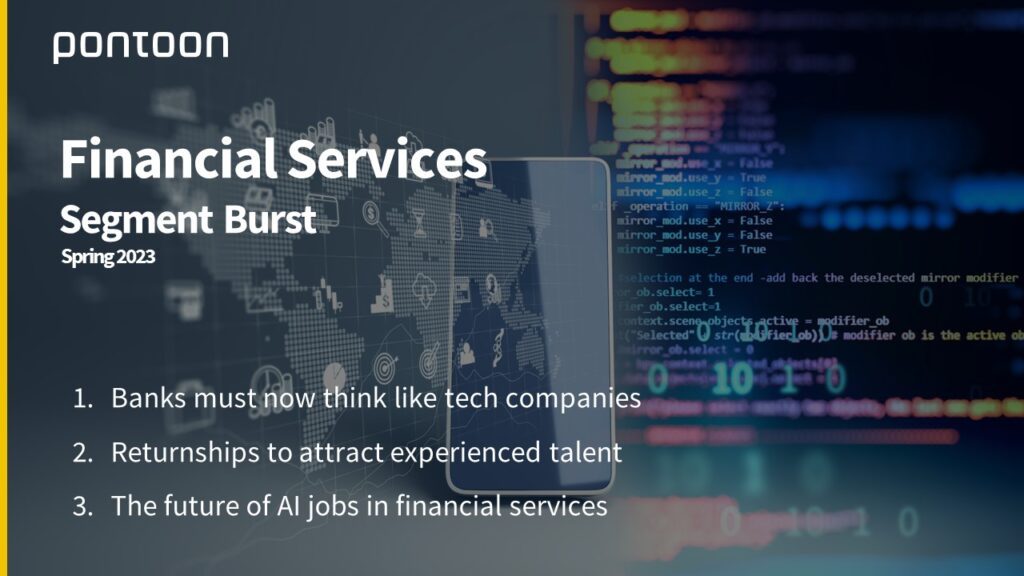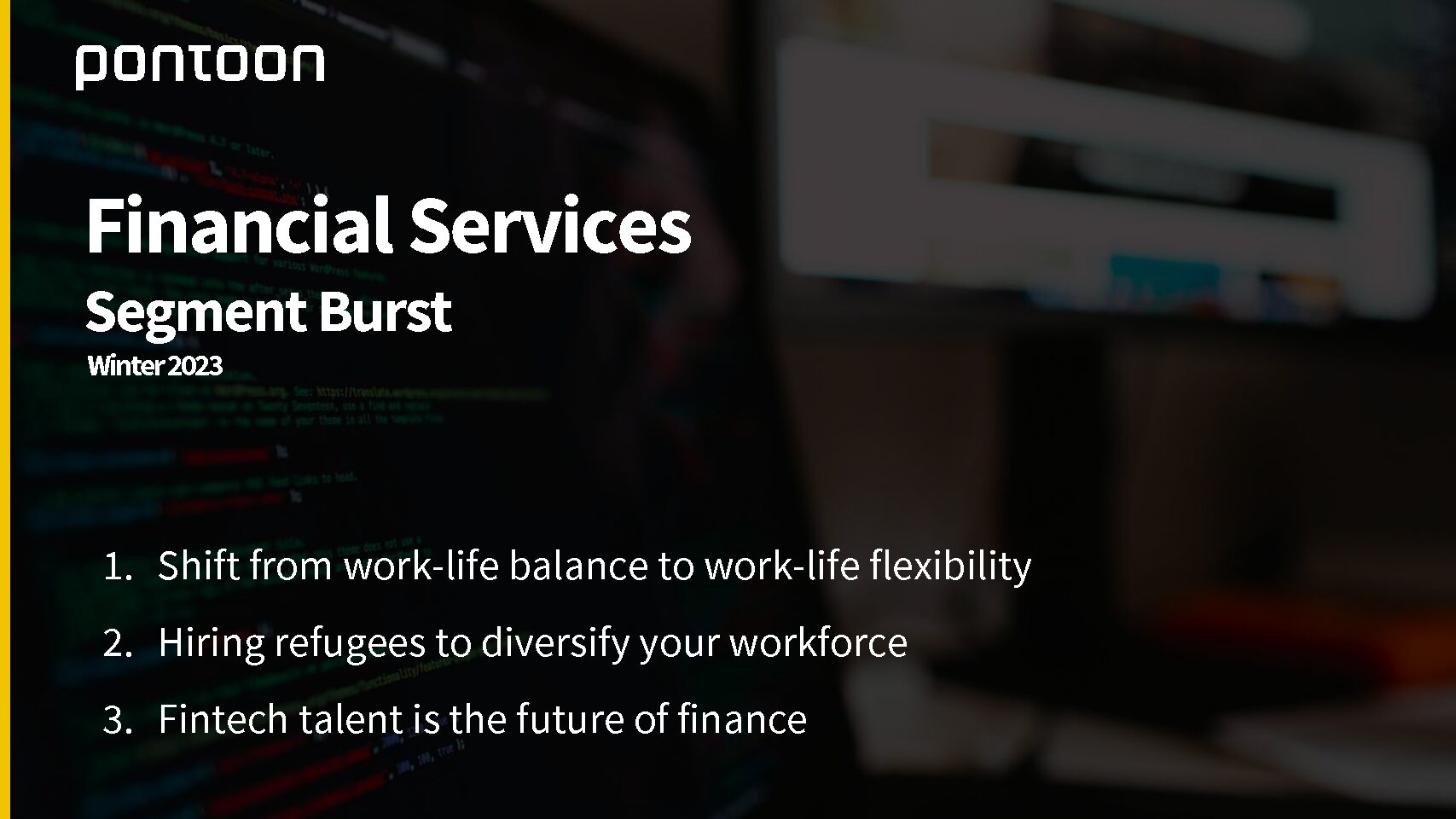Financial Services Segment Burst: Spring 2023
Research
.
In the Spring 2023 Financial Services Segment Burst, we explore the most recent trends in the financial services sector including:
-
Why banks must now think and act like tech companies to attract and retain talent
-
Creating returnship programmes to attract experienced financial talent
-
The future of AI jobs in financial services
Banks must now think like tech companies
Global banks must think more like tech companies to attract and retain future finance workers. Since traditional banks are now competing for talent with Silicon Valley, fintech, and other innovative financial start-ups, they need to adapt to changing expectations of their employees. Firms have begun upgrading core technologies to attract new talent, but research suggests that 58% of banks have slowed digital transformation as of late last year.
Offering a flexible work environment is one way in which traditional banks can buck this trend and compete with tech companies for the same talent. As more people embrace remote work, banks that provide flexibility will have a competitive advantage through increased productivity, greater employee satisfaction, and reduced turnover.
Engineers and software developers want to work for companies that embrace the latest technology and provide an environment where they can experiment and innovate. Banks must consider the desires of top candidates and create a company culture that fosters innovation and encourages experimentation. Accelerating change in the industry requires encouraging new bank employees to share their fresh perspectives and ideas. At the same time, more experienced and senior staff must remain receptive to differing opinions and open to change.
Regarding digital transformation initiatives, banks struggling to shift to digital should consider outsourcing transformation to fintech start-ups.
Another way for banks to think and act as tech firms is by offering learning and development programmes that align with their employees’ career aspirations. Providing workers with upskilling opportunities into emerging technologies, such as blockchain and artificial intelligence, shows firms’ commitment to their employees’ long-term success. In turn, it encourages loyalty and boosts retention. For example, JPMorgan Chase is in the middle of its $350 million “Reskilling Revolution” initiative, allowing employees to upskill in data science and AI areas.
Returnships to attract experienced talent
Taking a break from a career in financial services to raise children, pursue further education, switch careers, or handle other life events can lead to a daunting challenge for workers who want to return to the office. Research from LinkedIn found that 62% of employees have taken a career break at some point, and 53% say their break eventually made them better at their job.
To help workers transition back to the labour pool, financial services companies should consider setting up returnships to attract former employees and industry talent back to the company. These short-term paid internships offer an opportunity for talented individuals to re-enter the workforce and update their skills. Programmes also allow organisations to bring back individuals from underrepresented groups who may have left the industry due to personal or family reasons.
Returnships should be tailored to meet the needs of both the employee and the employer, with opportunities available across different roles and departments. For example, Goldman Sachs took the lead after the 2008 economic downturn by initiating a ground-breaking returnship programme. This scheme’s remarkable success is evidenced by its 15th-year run in 2023.
The insurance company Allstate has launched a 16-week returnship programme. Participants benefit from comprehensive training, education, mentorship, and support, with the potential for a job offer upon completion.
To maximise the value of returnships, financial companies must ensure that the opportunities are widely advertised and focus on attracting diverse candidates. Employers should also provide returners with support and guidance throughout the programme, including access to upskilling and networking. By offering returnships, employers can tap into an overlooked pool of talent, create a more inclusive and talent-rich workplace, and benefit from the skills and experience of individuals who have taken a career break.
The future of AI jobs in financial services
The financial services industry is rapidly evolving thanks to the integration of artificial intelligence (AI) and machine learning (ML) technologies. As a result, there is an increasing demand for professionals with AI expertise. According to a report by PwC, AI is expected to contribute over $15 trillion to the global economy by 2030, with the financial sector being one of the largest beneficiaries.
Attracting finance professionals skilled in AI applications will be crucial to future success. In terms of specific roles, data scientists, ML engineers, and AI specialists will be among the most highly in-demand functions. These individuals have the skills and expertise to develop and implement AI-powered solutions that can help drive business growth.
One area where AI is already significantly impacting business outcomes is financial fraud detection. With the help of AI, financial institutions can identify fraudulent transactions and prevent them from occurring in real-time. This is especially important as cyber-attacks become more sophisticated and frequent.
Recruiting is another area where this tech is being leveraged. AI-powered chatbots are automating parts of the hiring process and increasing candidate satisfaction. Bots reduce response time and free up human employees to focus on more complex tasks.
In addition to these areas, AI-focused jobs are expected to impact financial risk management. By analysing vast amounts of data, AI can help financial institutions make better decisions in investment management and loan underwriting. Consequently, professionals with AI skills and expertise to implement and manage this technology will be highly sought after in the coming years.
It is important to remember that AI is not a one-size-fits-all solution, and companies will need to tailor their approach depending on specific needs. By prioritising the development of AI talent and investing in the right roles, employers can position themselves well in an increasingly digital world.
Case Study: Preventing candidate fraud with AI
As our client shifted to remotely hiring contract labour, they encountered an increasing number of fraudulent candidates.
To combat this issue, we implemented an AI screening tool to identify and mitigate suspicious behaviour and security risks. As a result, the number of fraudulent candidates decreased, enabling our client to use their time more effectively on qualified candidates.
Read the full case study here.
Related Post
In the Winter 2023 Financial Services Segment Burst, we explore the most recent trends in the sector.
The shift from work-life balance to work-life flexibility
Hiring the world's refugees ...





